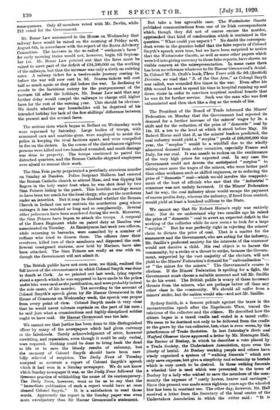The President of the Board of Trade informed the Miners'
Federation on Monday that the Government had rejected its demand for a further increase of the miners' wages by 2s. a shift and for the reduction of the price of " domestic " coal by 14s. 2d. a ton to the level at which it stood before May. Sir Robert Horne said that if, as the miners' leaders predicted, the coal industry would yield a " surplus " profit of £66,000,000 this year, the " surplus " would be a windfall due to the wholly abnormal demand from other countries, especially France and Italy, for our coal. It was unsafe to reckon on the continuance of the very high prices for exported coal. In any case the Government could not devote the anticipated " surplus " to raising once more the wages of the miners, who were better paid than other workmen such as skilled engineers, or to reducing the price of " domestic " ooal—which would involve the reappoint- ment of the host of officials who saw that the " industrial " consumer waa not unduly favoured. If the Miners' Federation had its way, the coal industry alone would escape the payment of excess profits duty, whereas the industry, if freed from control, would yield at least a hundred millions to the State.


































 Previous page
Previous page